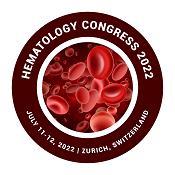
Briton Matata Kavulavu
Moi University School of Medicine, Kenya
Title: Blood Transfusion Services at the Eldoret Regional Blood Transfusion Centre (ERBTC)
Biography
Biography: Briton Matata Kavulavu
Abstract
Background: There is a need for a well-organized system with sufficient equipment and trained staff to meet the blood demand in Western Kenya.
Objectives: This research aimed at studying the problem of blood deficiency in Kenyan blood transfusion centers by considering the ERBTC’s challenges regarding human resource, financing, equipment, and reagent deficits; demand and supply mismatches; and blood wastages and discards.
Methodology: We used a cross-sectional descriptive design in which they administered questionanires to all ERBTC staff to gather information on the challenges of staffing, financing, equipment, and reagent deficits. Researchers also analyzed donor records to gather information on the prevalence of demand versus supply mismatches, blood discards and wastages, and the reasons for these. We analyzed data descriptively using Microsoft Excel 2019.
Results: The analysis included 16 staff, 230 donors, and 9612 units of requested blood. The study noted that the ERBTC was understaffed, and faced challenges of limited funding, few equipment, and irregular reagent supply. The blood bank only managed to supply only 4740 units of blood against a demand of 9612 units, thus a 50.69% deficit. A discard rate of 7.83% was also noted against 0% system wastages.
Conclusion:The study concluded that the main challenges facing the blood bank were understaffing, insufficient funding, limited equipment, and frequent reagent outages, excessive demand against limited supply, and blood discards.
Recommendations: The study recommended hiring of sufficient staff, increased funding, acquisition of equipment and reagents, and education of the public on the need for blood donation.

